|
|
|
Sort Order |
|
|
|
Items / Page
|
|
|
|
|
|
|
| Srl | Item |
| 1 |
ID:
191734
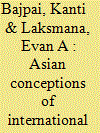

|
|
|
|
|
| Summary/Abstract |
How do major Asian states regard the current international security order? Do they agree or disagree among themselves? This is an introduction to a special section on ‘Asian conceptions of international order: what Asia wants’. It draws on articles analysing the stances of China, India, Japan, South Korea, Indonesia, Malaysia, Singapore, Thailand, Philippines and Vietnam towards the existing international security order usually described as a liberal international order (LIO). It argues that Asian states substantially support the main constitutive and regulatory norms and institutions of the LIO, but they worry that the LIO does not consistently honour these norms. Asians disagree on the centrality of political liberalism, but even Japan and South Korea, the most liberal states, are uncomfortable with strident criticism, punishment and the exclusion of less liberal states. Asians also disagree on the role of US alliances: some are strongly supportive, some are ambivalent and some are negative. Finally, Asians disagree on how they voice dissatisfaction. Japan and South Korea supplement existing norms and institutions as a way of transcending the limitations of the LIO; south-east Asian states promote ASEAN's mediatory role for peace and security above and beyond existing global arrangements; and Indonesia, India and China want to move from being norm takers to becoming norm shapers. The introduction ends with six policy implications.
|
|
|
|
|
|
|
|
|
|
|
|
|
|
|
|
| 2 |
ID:
084873
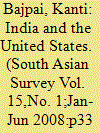

|
|
|
|
|
| Publication |
2008.
|
| Summary/Abstract |
A grand strategic partnership between India and the United States (US) can be constructed at five levels-the planetary, the global, the international, the continental and the regional. The focus, conventionally, is on the last three levels. Planetary and global changes, however, confront both countries with huge challenges. India and the US must find ways to cooperate in dealing with climate change and resource depletion, as also with a revolution in human affairs that promises emancipation but could end in reaction and violence. As two continental-sized, pluralistic democracies, they have unique strengths in building a better world.
|
|
|
|
|
|
|
|
|
|
|
|
|
|
|
|
| 3 |
ID:
182210


|
|
|
|
|
| Publication |
New Delhi, Juggernaut Books, 2021.
|
| Description |
284p.hbk
|
| Standard Number |
9789391165086
|
|
|
|
|
|
|
|
|
|
|
|
Copies: C:1/I:0,R:0,Q:0
Circulation
| Accession# | Call# | Current Location | Status | Policy | Location |
| 060102 | 327.54051/BAJ 060102 | Main | On Shelf | General | |
|
|
|
|
| 4 |
ID:
112221


|
|
|
|
|
| Publication |
New Delhi, Institute for Defence Studies and Analyses, 2011.
|
| Description |
40p.
|
| Series |
Second YB Chavan Memorial Lecture
|
|
|
|
|
|
|
|
|
|
|
|
Copies: C:2/I:0,R:0,Q:0
Circulation
| Accession# | Call# | Current Location | Status | Policy | Location |
| 056486 | 327.540951/BAJ 056486 | Main | On Shelf | General | |
| 056487 | 327.540951/BAJ 056487 | Main | On Shelf | General | |
|
|
|
|
| 5 |
ID:
064592
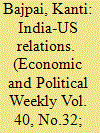

|
|
|
| 6 |
ID:
099153


|
|
|
| 7 |
ID:
089705
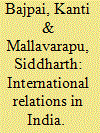

|
|
|
|
|
| Publication |
Hyderabad, Orient Blackswan Private Ltd., 2009.
|
| Description |
viii, 546p.
|
| Standard Number |
9788125026396
|
|
|
|
|
|
|
|
|
|
|
|
Copies: C:1/I:0,R:0,Q:0
Circulation
| Accession# | Call# | Current Location | Status | Policy | Location |
| 054331 | 327.0954/BAJ 054331 | Main | On Shelf | General | |
|
|
|
|
| 8 |
ID:
060057


|
|
|
|
|
| Publication |
New Delhi, Orient Longman, 2005.
|
| Description |
x, 546p.
|
| Standard Number |
8125026398
|
|
|
|
|
|
|
|
|
|
|
|
Copies: C:1/I:0,R:0,Q:0
Circulation
| Accession# | Call# | Current Location | Status | Policy | Location |
| 049369 | 327.0954/BAJ 049369 | Main | On Shelf | General | |
|
|
|
|
| 9 |
ID:
060058


|
|
|
|
|
| Publication |
New Delhi, Orient Longman, 2005.
|
| Description |
x, 414p.
|
| Standard Number |
8125026401
|
|
|
|
|
|
|
|
|
|
|
|
Copies: C:1/I:0,R:0,Q:0
Circulation
| Accession# | Call# | Current Location | Status | Policy | Location |
| 049368 | 327.0954/BAJ 049368 | Main | On Shelf | General | |
|
|
|
|
| 10 |
ID:
192096


|
|
|
|
|
| Summary/Abstract |
Recent China-India relations have been marked by a puzzling mix of cooperation and rivalry across military, economic, institutional and normative dimensions. Yet despite a large empirical literature on this crucial relationship, existing scholarship has struggled to explain its countervailing trends. This is due in large part to a lack of rigorous theory, which is essential for explanation. This article illustrates the theoretical shortcomings of current scholarship on China-India relations, drawing on the methodological literature on causal inference. It then shows how the four articles that follow in the special issue serve as a much-needed corrective to this problem by developing and applying well-specified theories to explain variation in China-India cooperation and rivalry, and presents a synthesis of their causal claims.
|
|
|
|
|
|
|
|
|
|
|
|
|
|
|
|
| 11 |
ID:
159535
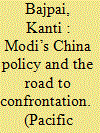

|
|
|
|
|
| Summary/Abstract |
The Doklam confrontation between India and China in the summer of 2017 was symbolic of the brewing tensions in their relationship. While the confrontation was resolved peacefully, its roots go back at least to 2007. Both the Manmohan Singh government and the Narendra Modi government pushed back against what they perceived to be a series of moves on bilateral, regional, and international issues that went against Indian interests. Modi’s responses have been more aggressive than Manmohan Singh’s in two ways. First, under Modi, India has more openly than ever before attempted to construct a coalition of militarily powerful states in the Asia-Pacific to increase Delhi’s bargaining power with Beijing. Second, India has sought to change the terms of engagement on the border conflict in three respects: a return to clarification of the Line of Actual Control (LAC) as the first step in border negotiations; linking further normalization between the two countries to progress towards a final border settlement; and seeking to inject a greater sense of urgency in the search for a settlement. This article concludes by asking why Modi responded more aggressively to China. It presents four explanations and concludes that Modi’s election in May 2014 coincided with a growing sense of strategic exasperation in India over its China policy, which questioned the value of the post-1988 commitment to normalization. The paper suggests that Modi shared that sense of exasperation, hence the rapid change in India’s stance within months of his coming to power.
|
|
|
|
|
|
|
|
|
|
|
|
|
|
|
|
| 12 |
ID:
153834


|
|
|
|
|
| Summary/Abstract |
Does Narendra Modi bring anything substantively new to Indian foreign policy? This article assesses Modi's record towards Pakistan and China, arguing that he has significantly changed the course of India's diplomacy, at two levels—bilateral diplomacy and coalition diplomacy. India has traditionally followed a policy of slow-to-anger, prudential bilateral diplomacy and, in the name of non-alignment, reluctant coalition-building against both powers. Under Modi, New Delhi has adopted a more assertive stance bilaterally and has actively sought to recruit third parties into a diplomatic coalition against Pakistan and China. Modi's assertive bilateralism has translated into an insistence that anti-terrorism is the only subject of discussion and that the Kashmir dispute with Pakistan is off the table. In the case of Beijing, assertive bilateralism has meant reversing India's traditional stance of normalization of relations leading to a border settlement by arguing that quicker progress on a settlement must be the condition for any further diplomatic normalization. Modi's coalition diplomacy has entailed an active engagement with the US, the Gulf countries and even China against Pakistan, and with the US, Australia, Japan, Vietnam and the Indian Ocean states against China. The objective is not alliance-building but rather the application of diplomatic pressures against India's two rivals. Modi's diplomacy has been marked by a cooperation–defection cycle with both powers, signalling a willingness to cooperate on India's terms and defect when it does not get its way. Not surprisingly, relations with both Pakistan and China have come under considerable strain.
|
|
|
|
|
|
|
|
|
|
|
|
|
|
|
|
| 13 |
ID:
095255
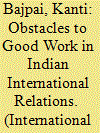

|
|
|
|
|
| Publication |
2009.
|
| Summary/Abstract |
This article suggests that, from 1947 to the late 1980s, Indian International Relations (IIR) led the developing world and certainly Asian IR. Since then, China, Korea and Japan seem to have taken the lead. The article defines the nature of 'good work' as 'good published work' and argues that there are five key obstacles to better published work in IIR: the neglect of theory; the failure to define a series of animating puzzles, problematiques and problem-solving agendas; the lack of methodological training; the quality of teaching; and the mismanagement of professional life. Three reasons are advanced for the origins and persistence of these obstacles: post-colonial parochialism; the influence of the formative moment of the field in India; and the relationship of Political Science/IR to the Indian state. The article concludes that the remedies are primarily in the hands of Indian scholars and not with the government
|
|
|
|
|
|
|
|
|
|
|
|
|
|
|
|
|
|
|
|
|